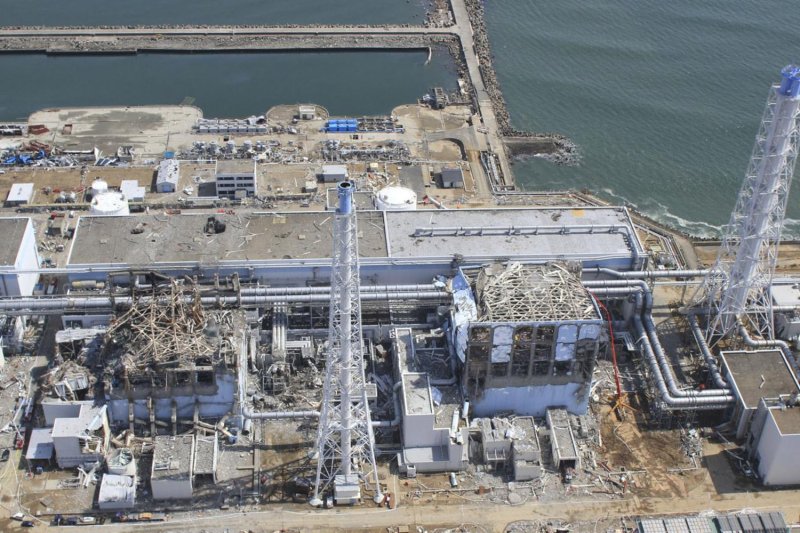1 of 5 | The crippled Fukushima Dai-ichi nuclear power plant in Okumamachi, Fukushima prefecture, northern Japan is seen in this March 24, 2011 aerial photo taken by small unmanned drone and released by AIR PHOTO SERVICE. UPI/Air Photo Service Co. Ltd. |
License Photo
TOKYO, May 3 (UPI) -- In the wake of Japan's nuclear crisis, fears are mounting that disaster could also strike the country's Hamaoka Nuclear Power Plant.
"The Hamaoka plant is potentially even more dangerous than Fukushima," Mizuho Fukushima (no relation to the crippled nuclear plant), leader of the Social Democratic Party of Japan, was quoted by The Christian Science Monitor newspaper as saying.
Situated on the Pacific coast in Omaezaki, about 112 miles southwest of Tokyo, Hamaoka is in an area where a magnitude-8 earthquake is strongly projected to hit.
"It should be closed down now," Fukushima said. "Scientists say the region in which Hamaoka is located is due for a major earthquake. If we wait until that happens, it will be too late."
While operator Chubu Electric says the plant is capable of withstanding an 8.5-magnitude earthquake and a 26-foot tsunami, those specifications would clearly be inadequate to handle the 9-magnitude earthquake and 30-foot tsunami of March 11 that crippled Japan's Fukushima nuclear power plant.
Hamaoka's two oldest reactors, Nos. 1 and 2, were decommissioned in 2009 because they were too old to justify costly safety upgrades, Chubu says. Reactors Nos. 4 and 5 nuclear reactors are in operation.
The No. 3 reactor had been shut down earlier for a regular inspection and was due to restart in April but Chubu opted for a provisional delay after the March 11 earthquake, citing "a sharp decline in public faith in the safety of nuclear plants."
The company aims to restart No. 3 in July, despite concerns about the plant's safety.
Japan's Nuclear and Industrial Safety Agency said last week it hadn't made a decision on resuming operations for the No. 3 reactor.
But Katsuhiko Ishibashi, professor emeritus of seismology at Kobe University said a restart of the No. 3 reactor was "out of the question" until Chubu had fully implemented emergency steps, reports Asahi Shimbun, a nationwide Japanese newspaper.
"It is the world's most dangerous nuclear power plant. All its reactors should have been shut down," he said, warning that the ground on which it sits could rise 10-20 feet if struck by an earthquake.
Warning against the restarting of reactor No. 3, an editorial last week in the Tokyo Shimbun said, "Simulations show that the radiation would reach Tokyo in half a day if disaster were to strike. Chubu Electricity says it is ready for emergencies. But it's far from being secure."















